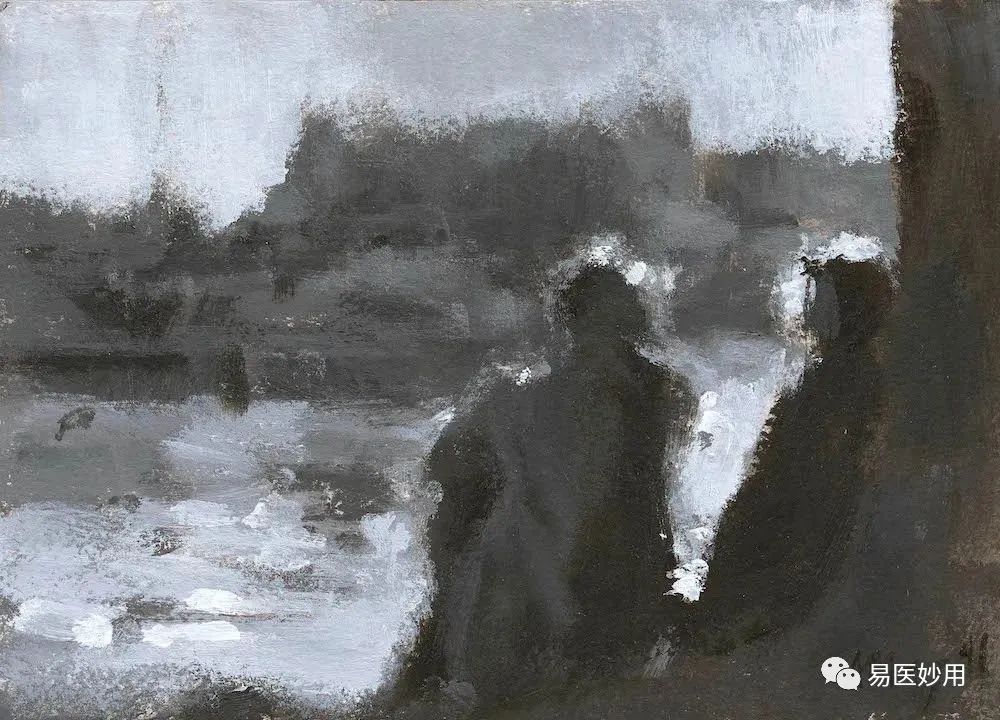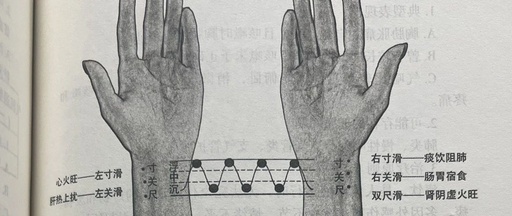
When diagnosing the 滑脉 (huá mài) or slippery pulse, the practitioner feels a pulse that is smooth and flowing, akin to a series of round balls rolling smoothly under the fingers. This sensation can be detected in the superficial, middle, and deep levels of the pulse. The slippery pulse is characterized by a greater fluidity than a normal pulse, but it can be challenging for beginners to master; it requires extensive practice and repeated experience to gradually understand. A smooth and gentle pulse is indicative of health and is commonly seen in young adults with abundant 气血 (qì xuè). If a woman experiences a slippery pulse after missing her period for two to three months, it may indicate a 妊娠脉 (rèn shēn mài), commonly referred to as a “joyful pulse.” Pathological slippery pulses are often associated with 痰湿 (tán shī) and 实热 (shí rè).
Daily Applications
(1) Left Cun Slippery Pulse — Heart Fire Excess (心火旺)
1. Typical Manifestations
A. Often feels irritable, restless before sleep, and suffers from insomnia.
B. Symptoms include heat in the palms or forehead, a red tongue tip, and bad breath.
2. Possible Health Issues: Mania, anxiety, palpitations, insomnia, etc.
3. Treatment Principles: Treatment should focus on clearing heat, nourishing heart yin, and calming the spirit. Daily diet should be light, and emotions should not be overly intense.
(2) Right Cun Slippery Pulse — Phlegm-Fluid Obstructing the Lungs (痰饮阻肺)
1. Typical Manifestations
A. Chest and rib pain with a sensation of phlegm, and pulling pain in the chest during coughing.
B. History of prolonged cold or cough without proper treatment.
C. Severe shortness of breath, unable to lie flat, and coughing and pain worsen with slight movement.
2. Possible Health Issues: Pneumonia, chronic pharyngitis, bronchitis, bronchiectasis, etc.
3. Treatment Principles: Phlegm-fluid is a product and waste that cannot be completely metabolized and eliminated during the body’s fluid circulation. Phlegm is often caused by external cold, irregular diet, emotional imbalance, or internal injury to the organs leading to dysfunction of qi transformation. Its characteristic is stickiness; if there is stagnation of fluid in the body, it forms a collection of moisture, known as fluid. The main manifestations of phlegm-fluid in the body are fullness and pain, and phlegm-fluid obstructing the lungs is often due to prolonged illness after an external attack of wind-heat or wind-cold.
(3) Left Guan Slippery Pulse — Liver Heat Disturbing the Heart (肝热上扰)
1. Typical Manifestations
A. Naturally irritable personality, with recent exacerbation.
B. Regular smoking and frequent alcohol consumption.
C. Dry and bitter mouth, especially noticeable in the morning.
2. Possible Health Issues: Acute hepatitis, fatty liver, cirrhosis, and other liver diseases.
3. Treatment Principles: Left Guan Slippery Pulse indicates liver heat; treatment should focus on clearing heat and detoxifying, soothing the liver, and relieving depression. A normal diet and lifestyle should be maintained, with a light diet, avoiding late nights, and rising early to prevent or reduce the occurrence of liver heat syndrome.
(4) Right Guan Slippery Pulse — Food Retention in the Stomach and Intestines (肠胃宿食)
1. Typical Manifestations
A. Often overeats, experiencing abdominal distension and pain after meals.
B. Consuming excessive hot foods like spicy dishes or durian.
2. Possible Health Issues: Appendicitis, intestinal polyps, gastric spasms, gastritis, and other gastrointestinal disorders.
3. Treatment Principles: The causes of food retention can include spleen and stomach weakness, consumption of cold foods, and irregular eating habits. For food retention due to spleen and stomach weakness, treatment should focus on strengthening the spleen and boosting qi; for cold invasion of the stomach, warming the stomach and dispersing cold is necessary; for those who overeat, treatment should focus on digesting food and relieving stagnation, possibly using formulas like 焦三仙 (jiāo sān xiān) (焦山楂,焦神曲,焦麦芽).
(5) Double Chi Slippery Pulse — Kidney Yin Deficiency with Excess Fire (肾阴虚火旺)
1. Typical Manifestations
A. Yellow, hot urine with a burning sensation during urination.
B. Heat in the palms and soles, sweating, frequent dry mouth, and night sweats.
C. Dizziness, tinnitus, and weakness in the lower back and knees.
D. In men, symptoms may include nocturnal emissions and premature ejaculation.
2. Possible Health Issues: Prostatitis, urinary tract infections, diabetes, etc.
3. Treatment Principles: The fire seen in the kidneys is often a manifestation of deficiency fire. The kidneys store the body’s original yin and yang; if essence is insufficient, it will present as fire symptoms, primarily deficiency fire, with night sweats and five hearts heat. Therefore, treatment should focus on nourishing kidney yin. However, many individuals have significant internal stagnation, and indiscriminate tonification may lead to excessive dampness that cannot be absorbed, so it is essential to ensure the body’s smooth functioning.

